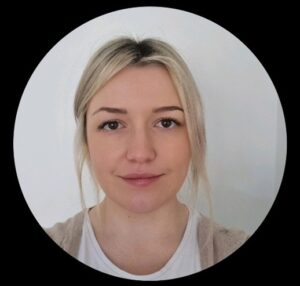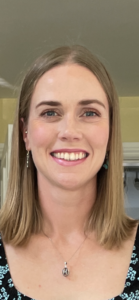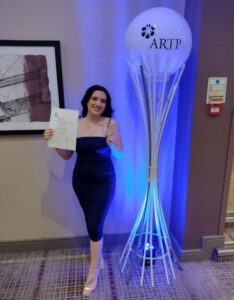As part of our focus on Healthcare Science Week, some of our colleagues have shared what their roles involve and what they enjoy about their work.
Ellen Whiteside is a Biomedical Scientist and a PhD Candidate within the IHC and Molecular part of Cellular Pathology at Blackpool Teaching Hospitals. The department performs complex tests to assist with accurate tumour classification, diagnosis, and precision treatments.
Ellen is also involved in research within the hospital and is an author on a research paper that was entered into the British Journal of Surgery. She has done other research projects within the department partnering with industry.
She said: “This role has enabled me to participate in opportunities such as being an adviser in The Cancer Genomic Report 2022 and participating in skilled training courses. I chose this career as it is a versatile area of science that enables research to be implemented into a medical setting. I get to make a difference in my local community and specialise in the area that you enjoy the most. ”
Heather Leonard is a Senior Clinical Physiologist, Respiratory and Sleep Physiology Department. Heather performs varied pulmonary function tests to aid diagnosis of lung conditions as well as diagnosing and providing routine follow up care of patients with Obstructive Sleep Apnoea (OSA), a very common sleep disorder. Heather says “It is a very important role as our testing will not only help diagnose conditions but also confirm whether another condition of the body has an impact on a patients’ breathing or if a treatment is working for patients or having a detrimental affect on the lungs. The tests can become routine for patients who come back every 6 or 12 months to keep a check on the progression of diseases but this leads to developing a rapport and relationship with these patients which is has its own rewards and comfort to yourself and the patient.”
Claire Rowlandson is a Senior Healthcare Scientist/Higher Specialist Scientific Trainee in Clinical Haematology.
Claire’s in her first year of a five year training plan with the long term goal of becoming a Consultant Clinical Scientist specialising in Haemostasis and Thrombosis. Her role involves developing the Haematology diagnostic service available to our patients within throughout the Trust and ensuring that our service users have access to the relevant guidance in interpreting results and using them to inform patient care. Claire started her career as a Biomedical Scientist in the Haematology and Blood Transfusion laboratories and combining practical investigations and knowledge to determine why a patient may present with a specific result is really rewarding. She says “Going forwards in my current role, knowing I can build on these skills and further inform patient care within a clinical setting keeps my role interesting.”
Holly Benson is a Respiratory and Sleep Healthcare Science Degree Apprentice
Holly has been working in the department for almost 7 years now and assists in the day to day running of our outpatient clinics across both respiratory and sleep specialties. She undertakes diagnostic testing, including full lung function studies for our respiratory patients, and sleep studies for patients with suspected sleep apnoea along with providing long term treatment. She also attends Manchester Metropolitan University once a week to undertake study as part of the Healthcare Science Practitioner Training Programme, allowing me to become a Healthcare Science Practitioner upon qualification.
Holly says “To me, a career in healthcare science is the perfect balance between providing patient care and an area of human physiology that is of particular interest to me. There is the constant opportunity to learn from others and develop your knowledge, which was an important factor for me when choosing a career path.”
Sue Evans is an assistant practitioner for the Point of Care department in Pathology here at Blackpool Victoria Hospital.
The Point of Care testing within the hospital is defined as taking medical testing near to the patient bedside or site by trained non-laboratory healthcare professionals. As healthcare technology in clinical practice is rapidly changing, it means more complex medical devices are being used in primary care settings. These devices and their users must meet high quality care for the patients as well as comply with relevant legal requirements. That’s where the Point of Care department comes in.
It is the Point of Care department’s responsibility to ensure the equipment is used correctly and maintained in a safe and reliable condition. This is done by closely monitored training sessions with refresher sessions after short periods of time for all the users. Our aim is to bring high laboratory standards of working into hospital wards and clinics.
This accelerates patient results which help with the speed of treatment for the patients and the time they need to stay in hospital. This also allows to take some of the pressure off the laboratories in Pathology.
Sue says “If you enjoy the thought of ever changing and developing science and the effect it has on helping people, then healthcare science is for you. There is the great job satisfaction knowing that you contribute to patient care within the high standards of a laboratory setting.”
You can watch short videos of Ryan, Sue and Laura here, discussing their roles in Healthcare Science.


